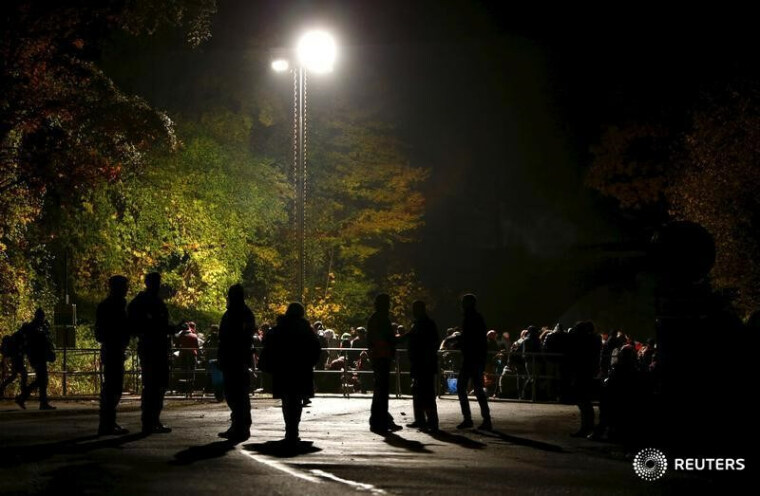No drop in asylum seekers reaching Germany, Berlin says

Germany has seen no drop in the number of people arriving and seeking asylum despite EU efforts to confront a migration crisis, the deputy interior minister said on Wednesday, blaming a lack of controls at Europe's borders.
More than a million people fleeing the Middle East and Africa arrived in Europe in 2015. Denmark began 2016 by imposing checks on its border this week, prompting the EU to call Germany, Denmark and Sweden to a meeting in Brussels.
Germany has been one of the most seriously affected EU member states. Sources in Berlin said on Wednesday the country registered some 1.09 million asylum seekers last year.
"We had an average influx of 3,200 refugees per day arriving in Germany, and the numbers are not declining in the last days," Ole Schroeder, the deputy German minister, told a briefing in Brussels. "Our problem at the moment in Europe is that we do not have a functioning border control system, especially at the Greece-Turkey border," Schroeder said.
The European Union is counting on Turkey to help reduce the number of migrants entering the bloc following a deal between Brussels and Ankara late last year for Turkey to absorb more people fleeing Syria's civil war.
Schroeder was speaking after meeting with EU migration chief Dimitris Avramopoulos and with Danish and Swedish officials to discuss temporary border controls after Denmark implemented spot checks on its border, raising new concerns about the durability of the EU's passport-free Schengen area.
Germany, Denmark and Sweden all said that they wanted to safeguard the Schengen zone but that effective controls on Europe's external borders, as well as other agreed measures, were necessary.
The European Commission, which has sought to help forge an EU migration policy since the death of hundreds of migrants in the Mediterranean last April, underscored the limited progress so far.
Of the 160,000 migrants that EU governments have agreed to relocate from Italy and Greece to other parts of the Union, only 272 people have been moved so far, it said on Wednesday.
Three centers for screening of migrants in Italy and Greece, known as hotspots, are operational, below the target of 11, though Italy is due to add two more early this year, it added.
 Christians don't have to affirm transgenderism, but they can’t express that view at work: tribunal
Christians don't have to affirm transgenderism, but they can’t express that view at work: tribunal Archaeology discovery: Medieval Christian prayer beads found on Holy Island
Archaeology discovery: Medieval Christian prayer beads found on Holy Island Presbyterian Church in America votes to leave National Association of Evangelicals
Presbyterian Church in America votes to leave National Association of Evangelicals Over 50 killed in 'vile and satanic' attack at Nigerian church on Pentecost Sunday
Over 50 killed in 'vile and satanic' attack at Nigerian church on Pentecost Sunday Ukrainian Orthodox Church severs ties with Moscow over Patriarch Kirill's support for Putin's war
Ukrainian Orthodox Church severs ties with Moscow over Patriarch Kirill's support for Putin's war Islamic State kills 20 Nigerian Christians as revenge for US airstrike
Islamic State kills 20 Nigerian Christians as revenge for US airstrike Man who served 33 years in prison for murder leads inmates to Christ
Man who served 33 years in prison for murder leads inmates to Christ


 Nigerian student beaten to death, body burned over ‘blasphemous’ WhatsApp message
Nigerian student beaten to death, body burned over ‘blasphemous’ WhatsApp message 'A new low': World reacts after Hong Kong arrests 90-year-old Cardinal Joseph Zen
'A new low': World reacts after Hong Kong arrests 90-year-old Cardinal Joseph Zen Iran sentences Christian man to 10 years in prison for hosting house church worship gathering
Iran sentences Christian man to 10 years in prison for hosting house church worship gathering French Guyana: Pastor shot dead, church set on fire after meeting delegation of Evangelicals
French Guyana: Pastor shot dead, church set on fire after meeting delegation of Evangelicals ‘Talking Jesus’ report finds only 6% of UK adults identify as practicing Christians
‘Talking Jesus’ report finds only 6% of UK adults identify as practicing Christians Mission Eurasia ministry center blown up in Ukraine, hundreds of Bibles destroyed: 'God will provide'
Mission Eurasia ministry center blown up in Ukraine, hundreds of Bibles destroyed: 'God will provide' Church holds service for first time after ISIS desecrated it 8 years ago
Church holds service for first time after ISIS desecrated it 8 years ago Burger King apologizes for 'offensive campaign' using Jesus' words at the Last Supper
Burger King apologizes for 'offensive campaign' using Jesus' words at the Last Supper Uganda: Muslims abduct teacher, burn him inside mosque for praying in Christ’s name
Uganda: Muslims abduct teacher, burn him inside mosque for praying in Christ’s name